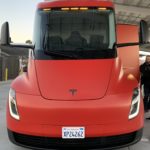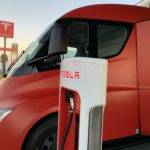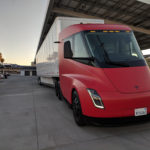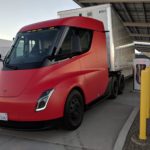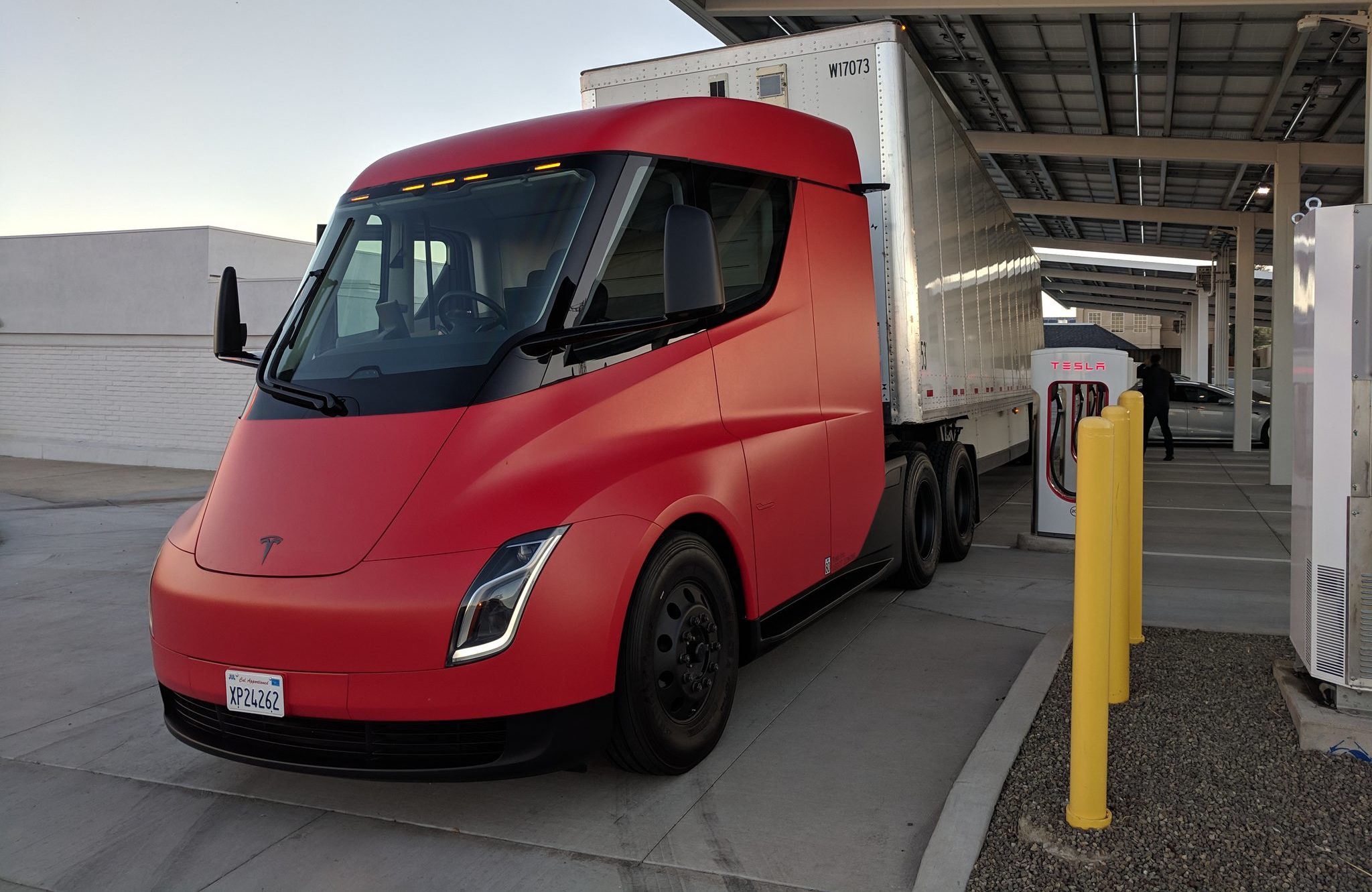

News
Tesla wraps matte black Semi prototype in stunning red amid continued road tests
Tesla has seemingly decided to spice up the road tests of its all-electric truck, wrapping one of its test mules in a stunning matte red color. The vehicle, which has caught the attention of the Tesla community, was spotted on the 405 in LA, before being sighted in the Kettleman City Supercharger.
While Tesla’s silver and matte black Semi prototypes are eye-catching trucks in their own right, there is no doubt that the matte red wrap makes the vehicle downright stunning. Inasmuch as initial sightings of the red test mule suggested that Tesla had produced another prototype, though, details such as the truck’s license plate and its trailer proved that the vehicle was just a wrapped version of the matte black prototype that Elon Musk debuted during the long-hauler’s unveiling.
Unlike prior sightings of the Semi, the matte red test mule appears to have stayed at the Kettleman City Supercharger for a rather long time. Tesla enthusiast and r/TeslaMotors member u/CardSpecialist, who sighted the vehicle in the Supercharger after sundown, noted that he was able to speak briefly with the Semi’s driver. According to the Tesla enthusiast, the driver of the vehicle stated that the red wrap has been getting a lot more looks compared to the truck’s previous matte black paint scheme.
- [Photo: Tim Alguire/Twitter]
- [Photo: Tim Alguire/Twitter]
- [Photo: Derek Rasina/Twitter]
- [Photo: Derek Rasina/Twitter]
The Tesla Semi in matte red. (Photo: Derek Rasina and Tim Alguire/Twitter)
Tesla is yet to provide any details behind its decision to change the color of one of its Semi test mules. That said, the new wrap does make the vehicle stand out more, resulting in more visibility for the upcoming all-electric long-hauler. With such an eye-popping color scheme, after all, the vehicle would likely catch the attention of even more potential reservation holders.
The Tesla Semi might be taking a backseat to the Model 3 for now, but the vehicle has a lot of potential to disrupt a very lucrative industry. To say that the trucking market presents a huge opportunity for Tesla is an understatement, considering that it is responsible for handling the transportation of up to 71% of the United States’ food, retail goods, and other cargo being delivered every day. The American Trucking Associations’ American Trucking Trends 2018 report, for one, noted that the US trucking industry generated $700.3 billion in economic activity last year. This is a market that Tesla could breach if the Semi proves to be a success.
The Tesla Semi definitely appears to have the necessary goods to disrupt the trucking industry. The Semi is a Class 8 truck, allowing it to haul a considerable amount of cargo. Performance-wise, the Semi also stands to shame its diesel counterparts, thanks to its four Model 3-derived electric motors that allow it to accelerate from 0 to 60 mph in 5 seconds flat without a trailer. With a full load, the Semi reaches highway speeds in 20 seconds, considerably faster than its fossil fuel-powered counterparts.
The Tesla Semi is also set to be equipped with semi-autonomous features. Among these is “Convoy Mode,” which would allow multiple trucks to semi-autonomously draft in close proximity with each other. Concept videos of the feature posted by Tesla show one manned Semi leading a couple of unmanned electric trucks. Musk noted during the vehicle’s unveiling that the Semi’s convoy tech is something that Tesla can already accomplish today.
The Tesla Semi is expected to start production sometime in 2019, though later statements from Tesla head of investor relations Martin Viecha suggested that the company would “earnestly” start producing the vehicle by 2020.
News
Tesla cleared in Canada EV rebate investigation
Tesla has been cleared in an investigation into the company’s staggering number of EV rebate claims in Canada in January.

Canadian officials have cleared Tesla following an investigation into a large number of claims submitted to the country’s electric vehicle (EV) rebates earlier this year.
Transport Canada has ruled that there was no evidence of fraud after Tesla submitted 8,653 EV rebate claims for the country’s Incentives for Zero-Emission Vehicles (iZEV) program, as detailed in a report on Friday from The Globe and Mail. Despite the huge number of claims, Canadian authorities have found that the figure represented vehicles that had been delivered prior to the submission deadline for the program.
According to Transport Minister Chrystia Freeland, the claims “were determined to legitimately represent cars sold before January 12,” which was the final day for OEMs to submit these claims before the government suspended the program.
Upon initial reporting of the Tesla claims submitted in January, it was estimated that they were valued at around $43 million. In March, Freeland and Transport Canada opened the investigation into Tesla, noting that they would be freezing the rebate payments until the claims were found to be valid.
READ MORE ON ELECTRIC VEHICLES: EVs getting cleaner more quickly than expected in Europe: study
Huw Williams, Canadian Automobile Dealers Association Public Affairs Director, accepted the results of the investigation, while also questioning how Tesla knew to submit the claims that weekend, just before the program ran out.
“I think there’s a larger question as to how Tesla knew to run those through on that weekend,” Williams said. “It doesn’t appear to me that we have an investigation into any communication between Transport Canada and Tesla, between officials who may have shared information inappropriately.”
Tesla sales have been down in Canada for the first half of this year, amidst turmoil between the country and the Trump administration’s tariffs. Although Elon Musk has since stepped back from his role with the administration, a number of companies and officials in Canada were calling for a boycott of Tesla’s vehicles earlier this year, due in part to his association with Trump.
News
Tesla Semis to get 18 new Megachargers at this PepsiCo plant
PepsiCo is set to add more Tesla Semi Megachargers, this time at a facility in North Carolina.

Tesla partner PepsiCo is set to build new Semi charging stations at one of its manufacturing sites, as revealed in new permitting plans shared this week.
On Friday, Tesla charging station scout MarcoRP shared plans on X for 18 Semi Megacharging stalls at PepsiCo’s facility in Charlotte, North Carolina, coming as the latest update plans for the company’s increasingly electrified fleet. The stalls are set to be built side by side, along with three Tesla Megapack grid-scale battery systems.
The plans also note the faster charging speeds for the chargers, which can charge the Class 8 Semi at speeds of up to 1MW. Tesla says that the speed can charge the Semi back to roughly 70 percent in around 30 minutes.
You can see the site plans for the PepsiCo North Carolina Megacharger below.

Credit: PepsiCo (via MarcoRPi1 on X)

Credit: PepsiCo (via MarcoRPi1 on X)
READ MORE ON THE TESLA SEMI: Tesla to build Semi Megacharger station in Southern California
PepsiCo’s Tesla Semi fleet, other Megachargers, and initial tests and deliveries
PepsiCo was the first external customer to take delivery of Tesla’s Semis back in 2023, starting with just an initial order of 15. Since then, the company has continued to expand the fleet, recently taking delivery of an additional 50 units in California. The PepsiCo fleet was up to around 86 units as of last year, according to statements from Semi Senior Manager Dan Priestley.
Additionally, the company has similar Megachargers at its facilities in Modesto, Sacramento, and Fresno, California, and Tesla also submitted plans for approval to build 12 new Megacharging stalls in Los Angeles County.
Over the past couple of years, Tesla has also been delivering the electric Class 8 units to a number of other companies for pilot programs, and Priestley shared some results from PepsiCo’s initial Semi tests last year. Notably, the executive spoke with a handful of PepsiCo workers who said they really liked the Semi and wouldn’t plan on going back to diesel trucks.
The company is also nearing completion of a higher-volume Semi plant at its Gigafactory in Nevada, which is expected to eventually have an annual production capacity of 50,000 Semi units.
Tesla executive teases plan to further electrify supply chain
News
Tesla sales soar in Norway with new Model Y leading the charge
Tesla recorded a 54% year-over-year jump in new vehicle registrations in June.

Tesla is seeing strong momentum in Norway, with sales of the new Model Y helping the company maintain dominance in one of the world’s most electric vehicle-friendly markets.
Model Y upgrades and consumer preferences
According to the Norwegian Road Federation (OFV), Tesla recorded a 54% year-over-year jump in new vehicle registrations in June. The Model Y led the charge, posting a 115% increase compared to the same period last year. Tesla Norway’s growth was even more notable in May, with sales surging a whopping 213%, as noted in a CNBC report.
Christina Bu, secretary general of the Norwegian EV Association (NEVA), stated that Tesla’s strong market performance was partly due to the updated Model Y, which is really just a good car, period.
“I think it just has to do with the fact that they deliver a car which has quite a lot of value for money and is what Norwegians need. What Norwegians need, a large luggage space, all wheel drive, and a tow hitch, high ground clearance as well. In addition, quite good digital solutions which people have gotten used to, and also a charging network,” she said.
Tesla in Europe
Tesla’s success in Norway is supported by long-standing government incentives for EV adoption, including exemptions from VAT, road toll discounts, and access to bus lanes. Public and home charging infrastructure is also widely available, making the EV ownership experience in the country very convenient.
Tesla’s performance in Europe is still a mixed bag, with markets like Germany and France still seeing declines in recent months. In areas such as Norway, Spain, and Portugal, however, Tesla’s new car registrations are rising. Spain’s sales rose 61% and Portugal’s sales rose 7% last month. This suggests that regional demand may be stabilizing or rebounding in pockets of Europe.
-

 Elon Musk2 weeks ago
Elon Musk2 weeks agoTesla investors will be shocked by Jim Cramer’s latest assessment
-

 Elon Musk2 days ago
Elon Musk2 days agoxAI launches Grok 4 with new $300/month SuperGrok Heavy subscription
-

 Elon Musk4 days ago
Elon Musk4 days agoElon Musk confirms Grok 4 launch on July 9 with livestream event
-

 News1 week ago
News1 week agoTesla Model 3 ranks as the safest new car in Europe for 2025, per Euro NCAP tests
-

 Elon Musk2 weeks ago
Elon Musk2 weeks agoA Tesla just delivered itself to a customer autonomously, Elon Musk confirms
-

 Elon Musk1 week ago
Elon Musk1 week agoxAI’s Memphis data center receives air permit despite community criticism
-

 News2 weeks ago
News2 weeks agoXiaomi CEO congratulates Tesla on first FSD delivery: “We have to continue learning!”
-

 Elon Musk1 week ago
Elon Musk1 week agoTesla scrambles after Musk sidekick exit, CEO takes over sales

